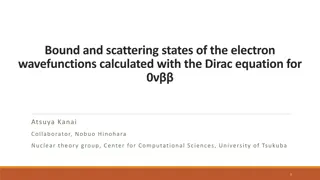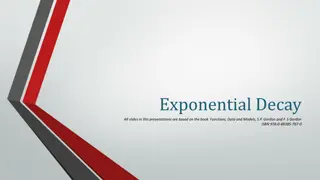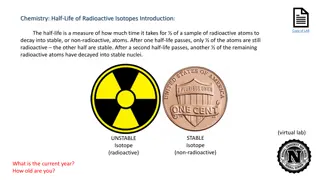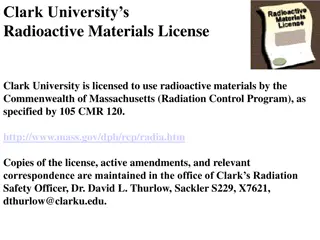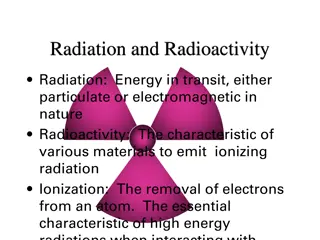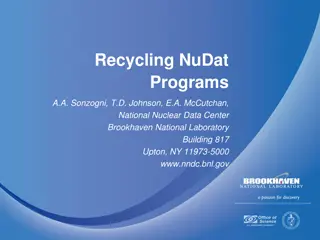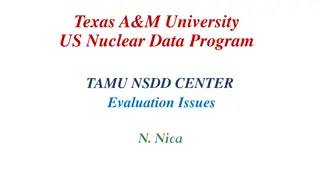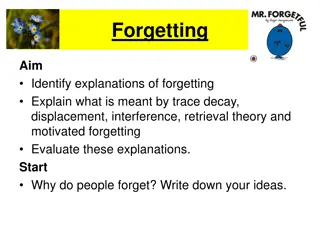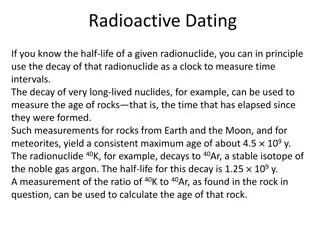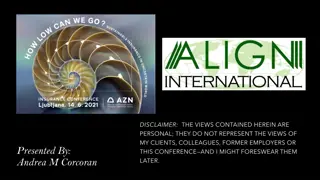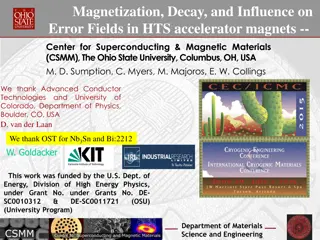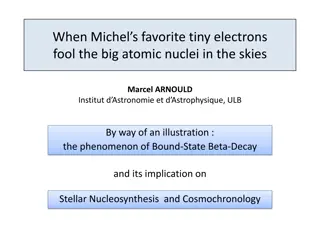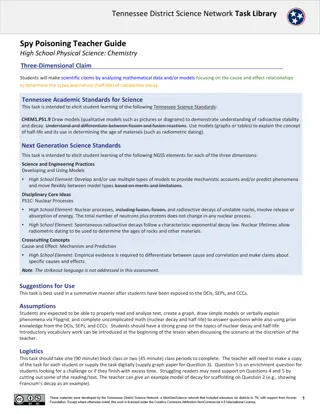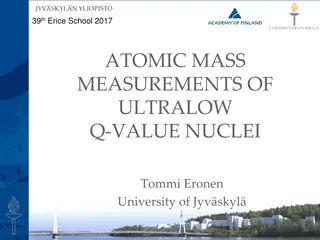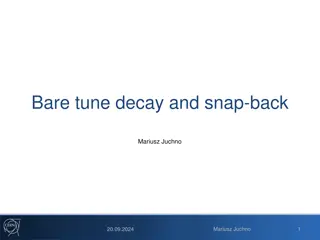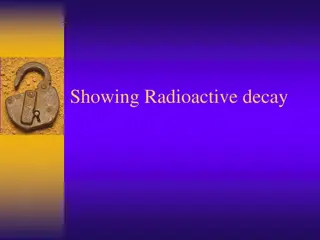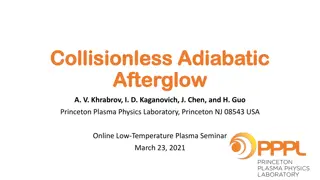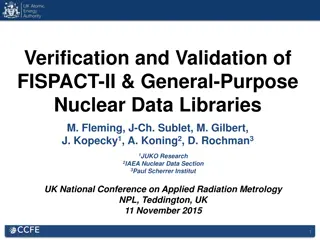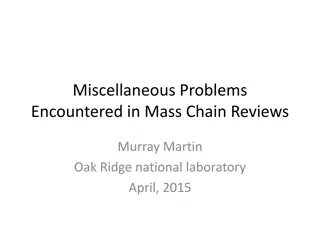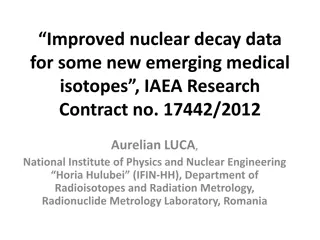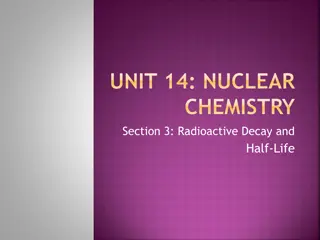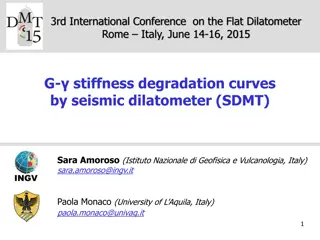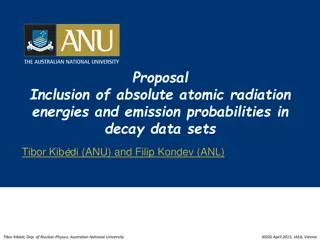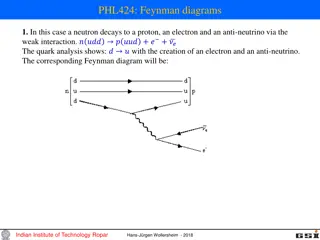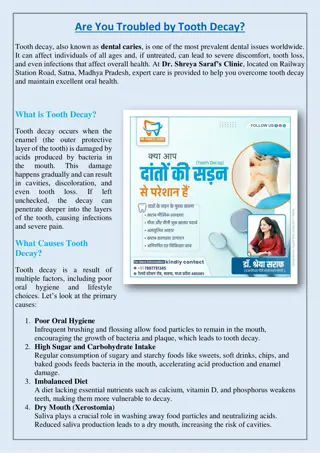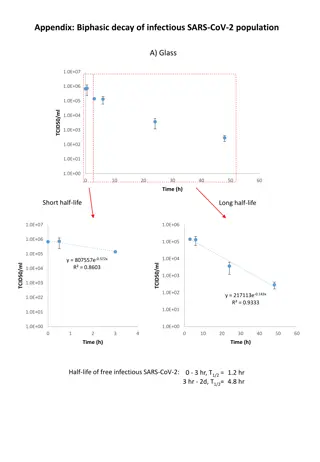Understanding Knowledge Management: Processes and Frameworks 2. In knowledge management, organizations create, share, and manage knowledge to enhance performance. It involves acquiring different types of knowledge through various means, such as perc
Knowledge Management, Organizational Objectives, Types of Knowledge, Tacit Knowledge, Explicit Knowledge
1 views • 17 slides
Understanding Radioactive Decay and Nuclear Radiation
Radioactive decay is the process in which unstable atomic nuclei emit charged particles and energy, transforming into different elements. This process involves the emission of alpha particles, beta particles, and gamma rays. Alpha particles consist of two protons and two neutrons, beta particles are
4 views • 31 slides
Quantum Physics Research on Electron Wavefunctions and Double-Beta Decay
Researchers at the University of Tsukuba study electron wavefunctions using the Dirac equation and analyze double-beta decay in nuclei. The calculation of phase space factors, nuclear matrix elements, and bound and scattering states of electrons are explored to understand fundamental particles and t
0 views • 12 slides
Understanding Exponential Decay in Ibuprofen Dosage
Explore the concept of exponential decay using an example of ibuprofen dosage elimination from the bloodstream. Learn how to calculate the remaining dosage at different time intervals based on the decay rate. Discover the relation between the initial dosage, elimination rate, and time passed.
2 views • 22 slides
Understanding Forgetting: Theories and Influence on Memory Recall
Forgetting is a complex phenomenon influenced by theories such as Decay Theory, Interference Theory, and Motivated Forgetting. The Ebbinghaus forgetting curve highlights how memories fade over time. Decay Theory suggests memories decay over time, while Interference Theory explains how old and new me
0 views • 25 slides
Understanding Radioactivity and its Particles in Radiochemistry
Radioactivity involves the spontaneous decay of unstable atomic nuclei, releasing radiation in the form of alpha particles, beta particles, and gamma rays. Alpha particles are heavy and have low penetration, beta particles are light and faster, while gamma rays are high-energy waves with great penet
1 views • 20 slides
Exploring Radioactive Decay: A Half-Life Lab Simulation
Explore the concept of radioactive decay through a virtual lab simulation involving strontium-90 (Sr-90) and yttrium-90 (Y-90) isotopes. Witness the decay process over multiple half-lives as unstable atoms transform into stable nuclei. Dive into the intricacies of half-life measurements and the vast
0 views • 10 slides
Understanding Radioactivity: A Comprehensive Overview
Radioactivity is the spontaneous decay of unstable atomic nuclei, emitting alpha, beta, or gamma rays. This phenomenon is regulated by Massachusetts laws, with institutions like Clark University licensed for responsible use. Alpha decay involves emission of helium nuclei, while beta decay releases e
0 views • 39 slides
Understanding Radiation and Radioactivity in Science
Radiation is energy in transit, while radioactivity is the emission of ionizing radiation by materials. This process involves ionization, which removes electrons from atoms, leading to various nuclear decay processes such as alpha decay, beta decay, gamma-ray emission, positron decay, electron captu
0 views • 80 slides
Nuclear Data Recycling Using NuDat Programs
Explore the use of NuDat classes in plotting beta-minus decay half-lives, electron capture processes, reliable ECp values, and antineutrino spectra calculations. Delve into topics like cross-section spectra, thermal fission yields, and the decay of various nuclides. The research also discusses assum
0 views • 14 slides
Exploring Nuclear Equations and Beta Decay in Physics
Understanding the development of scientific theories like beta decay and nuclear equations through the work of Enrico Fermi and Chien-Shiung Wu. Discover the collaborative nature of scientific progress, where experiments validate theories and correct errors. Scientists worldwide, including George Ga
0 views • 7 slides
Challenges in Nuclear Data Program Evaluation and Remedies
Exploring evaluation challenges in a nuclear data program, including issues with decay cases and ambiguous notations. Remedies such as redesignating levels and clarifying decay probabilities are discussed to address these challenges.
0 views • 7 slides
Exploring Explanations of Forgetting in Memory
This content delves into various explanations of forgetting in memory, such as trace decay, displacement, interference, retrieval theory, and motivated forgetting. It discusses why people forget and evaluates these theories. Additionally, it explores the Multi Store Model of Memory and concepts like
0 views • 74 slides
Understanding Radioactive Dating Methods
The process of radioactive dating involves utilizing the decay of radionuclides to measure time intervals, with applications in determining the age of rocks and artifacts. Techniques such as radiocarbon dating, based on isotopes like 14C, enable scientists to determine the age of organic materials b
0 views • 4 slides
Enhancing Resilience: US Insurers' Role in Combating Infrastructure Decay and Climate Challenges
Explore how US insurers can contribute to resilience-building efforts amid infrastructure decay and climate-related challenges. The discussion covers historical perspectives, public-private partnerships, notable climate disasters, and the imperative for proactive action by policymakers. Discover the
2 views • 21 slides
Reflections of Decay: Edgar Allan Poe's Dark Journey
The content delves into the exploration of decay within the soul of a person and how it might manifest in their personality, clothing, lodging, and outer appearance. Through a series of thought-provoking questions, literary excerpts, and historical insights, the essence of decay and its potential ma
0 views • 11 slides
Magnetization, Decay, and Error Fields in HTS Accelerator Magnets
The research conducted at The Ohio State University focuses on understanding the magnetization, decay, and influence of error fields in high-temperature superconducting (HTS) accelerator magnets. The study explores the impact of different superconducting materials such as Nb3Sn, YBCO, and Bi:2212 on
0 views • 21 slides
Understanding Nuclear Decays and Reactions in Stellar Astrophysics
Nuclear decays and reactions, driven by weak interactions, are vital in stellar astrophysics. Various processes like bound-state beta-decay impact nucleosynthesis and cosmochronology. Specific processes in stars involve capture reactions, electron capture, and neutrino-nucleus interactions. Stellar
0 views • 22 slides
Quality Education for a Healthier Scotland - Smile4life Initiatives and Oral Health Awareness
Explore Smile4life's programs focused on promoting oral health across Scotland. Learn about giving health advice, understanding the importance of oral health, and combating tooth decay through education. Discover key messages on diet, hidden sugars, and tooth decay prevention. Dive into the findings
0 views • 30 slides
Investigating Agent Z's Poisoning: A Case of Radioactive Decay
Agent Z, a double spy, was poisoned with Polonium-210, a heavy, radioactive element. This task challenges students to analyze the cause of his death using concepts of nuclear decay and half-life modeling based on provided data and models. The scenario involves understanding the effects of radioactiv
0 views • 14 slides
Atomic Mass Measurements of Ultralow Q-Value Nuclei at University of Jyvaskyla
Explore the cutting-edge research on atomic mass measurements of ultralow Q-value nuclei conducted at the University of Jyvaskyla. This research delves into various techniques such as Penning trap atomic mass spectroscopy and PI-ICR to study Q-values for reactions and neutrino studies. The investiga
0 views • 29 slides
Exploring Urban Decay in Art and Design
Dive into the artistic exploration of urban decay through peeling wall surfaces in Year 10 Art and Design curriculum. Uncover inspiration from dilapidated surroundings, study related readings, and engage in assessments focused on this evocative theme.
0 views • 44 slides
Navigating the World of Big Data, Knowledge, and Crowdsourcing
The world has evolved into a data-centric landscape where managing massive amounts of data requires the convergence of big data, big knowledge, and big crowd technologies. This transformation necessitates the utilization of domain knowledge, building knowledge bases, and integrating human input thro
1 views • 5 slides
Reflections on Insensibility and Spiritual Decay by St. John Climacus
St. John Climacus delves into the dangers of insensibility, highlighting how it leads to a numbed spirit, negligence, and a loss of feeling. He emphasizes the detrimental effects on the soul and mind, portraying individuals who preach virtues but fail to live by them, succumbing to hypocrisy and mor
0 views • 8 slides
Importance of Oral Hygiene and Preventing Tooth Decay in Children
Understanding the significance of oral hygiene and preventing tooth decay in children is crucial for their overall health. By learning about dental plaque, causes of tooth decay, effective teeth brushing techniques, and the impact of sugary foods and drinks, children can take steps to maintain good
0 views • 21 slides
Analysis of Tune Variation and Decay in Large Hadron Collider
This analysis focuses on the tune variation and decay of the bare machine tune in the Large Hadron Collider. It covers the evolution of the bare tune, analysis of the tune decay after injection, fitting of decay constants, and data extraction from 2015. The study includes insights into beam commissi
0 views • 16 slides
Understanding Compound Growth and Decay Through Examples
Compound growth and decay, specifically compound interest, involve calculating interest on a changing total amount over time. This concept is illustrated through various examples and equations, showcasing how investments or values increase or decrease with each period. Learn how to solve problems re
0 views • 9 slides
Understanding Radioactive Decay and Isotopes in Chemistry
Explore the fascinating world of radioactive decay, isotopes, and nuclear transformations in this educational resource. From reviewing atomic numbers to illustrating alpha and beta decay processes, discover the fundamental principles behind these phenomena with detailed explanations and visuals. Del
0 views • 17 slides
Understanding Modelling Knowledge and Knowledge Representation
Explore the significance of modelling knowledge through knowledge representation, making it explicit, independent, and reusable. Learn why knowledge representation is essential and how it facilitates exchange, query, inference, and visualization. Delve into examples of knowledge application in vario
0 views • 30 slides
Evolution of Collisionless Plasma Bounded by Absorbing Walls
Study on the evolution of collisionless plasma between absorbing walls, analyzing rarefaction waves, density profiles, and plasma potential decay. Kinetic simulations reveal gas dynamics-like behavior with flat density profiles and linear velocity profiles leading to asymptotic decay. The influence
0 views • 15 slides
Verification and Validation of FISPACT-II & General-Purpose Nuclear Data Libraries
The paper discusses the verification and validation of FISPACT-II and general-purpose nuclear data libraries presented at the UK National Conference on Applied Radiation Metrology. It covers new features of FISPACT-II, fusion decay heat experiments, uncertainty quantification, collaboration opportun
0 views • 17 slides
Comparison of Measurement Results for Tau Decay Time
The data provided includes measurements of tau (τ) decay time, resulting in half-lives (T½). Measurement 1 shows τ as 1.2 ps, converting to T½=0.83 ps, while Measurement 2 indicates T½=0.90 ps. The discrepancy between the two measurements prompts a closer examination of the experimental setup o
0 views • 20 slides
Enhanced Nuclear Decay Data for Medical Isotopes Research
Improved nuclear decay data for emerging medical isotopes was evaluated as part of an IAEA research contract. The process involved reviewing previous evaluations, gathering experimental data, compiling decay data sets, and disseminating results. Challenges at IFIN-HH/LMR included limited funding and
0 views • 32 slides
Understanding Dental Caries Development and Factors Affecting Tooth Decay
Dental caries, commonly known as tooth decay, is a result of localized chemical dissolution of the tooth surface due to metabolic events in the biofilm. Factors like host susceptibility, plaque formation, diet, and time play a crucial role in the carious process. Tooth morphology, position of teeth,
0 views • 23 slides
Understanding Radioactive Decay and Half-Life in Nuclear Chemistry
Exploring the concept of radioactive decay and half-life in nuclear chemistry, this content covers the types of nuclear radiation, alpha decay of Uranium, and the significance of half-life in determining the decay of radioactive substances such as Carbon-14. An example with Fluorine-18 illustrates t
0 views • 9 slides
Insights into Soil Stiffness Degradation Using Seismic Dilatometer Data
This content discusses the analysis of soil stiffness degradation curves using data collected from the Flat Dilatometer and Seismic Dilatometer tests. Researchers Sara Amoroso and Paola Monaco present methods for deriving in situ G- decay curves and evaluating shear strain data in various soil types
0 views • 18 slides
Integration of Atomic Radiation Energies and Emission Probabilities in Decay Data Sets
Proposal by Tibor Kibdi and Filip Kondev to include absolute atomic radiation energies and emission probabilities in decay data sets. They emphasize the need for energy and intensity data to be computer-readable and use standard notation. The inclusion of atomic relaxation data into ENSDF is discuss
0 views • 7 slides
Understanding Feynman Diagrams in Particle Physics
Exploring the concept of Feynman diagrams in particle physics through various examples, such as the decay of particles like neutrons, protons, electrons, anti-neutrinos, pi-mesons, and more. The diagrams illustrate the interactions between quarks and leptons, showcasing the transformations and decay
0 views • 14 slides
Treatement of Tooth Decay - Saraf Dental Clinic
Are you troubled by tooth decay? Visit Dr. Shreya Saraf, an expert in Periodontology, located at Railway Station Road, Satna, Madhya Pradesh. Tooth decay is caused by poor oral hygiene, sugary diets, and lack of dental care. Get advanced, personalize
2 views • 4 slides
Biphasic Decay of Infectious SARS-CoV-2 Population
This study analyzes the biphasic decay of infectious SARS-CoV-2 populations on different surfaces. The data shows variations in the decay rates of the virus on materials such as glass, banknotes, stainless steel, plastic, and mask layers. The findings reveal differing half-lives and decay patterns,
0 views • 6 slides


